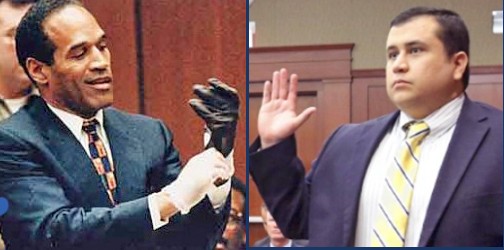
It’s been 18 years since the conclusion of the O.J. Simpson murder trial and my writing an op-ed for the Flyer expressing a reaction to the jurors’ verdict of “not guilty” that highly gratified some readers and outraged others.
I should point out that I saw that verdict coming and wrote my dissatisfaction with it a day or so ahead of time. The late Dennis Freeland, who was then the Flyer‘s editor, was glad to have something that topical in the can (the verdict was due right at our deadline time), but we agreed that I should write another version just in case of a guilty verdict.
The backup version was congratulatory of the jury’s efforts; the original version — the one I felt sure we’d be using and had written more or less spontaneously — was critical. In essence, it suggested that the jury, motivated more by racial factors than evidentiary ones, was responding more or less politically to a case which the defense had stage-managed perfectly and the prosecution had botched.
Challengers of the Zimmerman verdict are alleging something similar in a case in which, once again, the accused and the deceased were of different races.
There are clear differences, of course. The element of self-defense, which strengthened the defense’s reasonable-doubt position in the Zimmerman trial, was totally lacking in the Simpson case. That one, the violent slaughter of Simpson’s wife and a visiting male friend, was murder pure and simple. The question there was: Did Simpson, the accused, do it or did someone else?
There was no doubt in the current case that Zimmerman, performing a neighborhood-watch round, shot and killed Trayvon Martin in an altercation resulting from his stalking of Martin as a suspected criminal. Tragically, Zimmerman was wrong; contributing to the tragedy, Martin — apparently innocent of any ill purpose but not quite the timid youth of early reports — seems to have overreacted with undue ferocity to the fact of being shadowed.
One compelling difference between the two cases is the fact that the lawyers on the losing side in 1995 were seriously aggrieved then and have remained so ever since, while the members of the prosecution in 2013 conceded more or less gracefully and have urged acceptance of the verdict and the system that produced it.
Understandably, Trayvon Martin’s family members are less forgiving. And Zimmerman, while technically not guilty and acting, no doubt, in fear for his safety or perhaps for his life, still would not have taken someone else’s life had he, a private individual, not been packing heat and acting under the peculiarly broad license of Florida’s “Stand Your Ground” law.
There’s a reason why we have officially endowed — and trained — law-enforcement organizations in this country. “Taking the law into your own hands” used to be a serious no-no. Now it’s a practice actively encouraged by the N.R.A. and servile state legislatures. The right wing in this country has traveled a perilous distance from “Support Your Local Police” to co-opting the police power for itself.
Which is to say, the problem with the Zimmerman case was arguably not the verdict, and it was not race, except very incidentally. It wasn’t even Zimmerman. It was today’s permissive attitude toward armed vigilantism. Critics of the Florida jury’s decision should redirect their animus at that fact and cease trying to re-cast poor Trayvon Martin as a latter-day Emmett Till or Medgar Evers.
With the best will in the world (I was a big-time fan of O.J. the player and broadcaster), I still think O.J. Simpson was guilty and that the evidence amply demonstrated the point. The same evidence would later convict him in a wrongful-death civil trial. Were people — including members of the largely African-American jury which acquitted him — influenced by considerations of race? Undeniably.
There is no question, either, that race impacted attitudes toward Zimmerman, though his case has cleaved more clearly along lines of left vs. right. I think President Obama has it right by declining to second-guess the verdict of not guilty, but I think it was inevitable and proper for the Department of Justice to look into the prospects of retrial on civil-rights grounds.
But if the case is revived on that basis, it should concentrate on whether or not the deceased’s civil rights were violated by the legalistic gun fetishism of our time, not by the issue of his skin color or his assailant’s.
That was the wrong lens for seeing O.J. Simpson’s case, and it remains the wrong one to look into the tragedy that befell Trayvon Martin.
Jackson Baker is a Flyer senior editor.